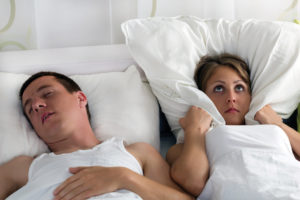
Is your spouse complaining that you snore every night, so much so that he or she cannot sleep? You can–and should– do something about your loud snoring, give your household a chance to rest and keep your overall health strong, too. An oral appliance from Mt. Holly Family Dentistry positions the lower jaw in a more forward position, reducing or eliminating snoring and the adverse health effects associated with sleep apnea. Our doctors sees patients with snoring and sleep apnea in his Lumberton office and helps them optimize their rest and their overall health.
Is It Just Snoring or Something Else?
Everyone snores occasionally. Nasal congestion or simply sleeping for too long on your back cause snoring that’s nothing more than a bothersome noise. Some individuals, however, snore so persistently and loudly that their families can’t sleep well. Moreover, these individuals show symptoms of something more serious–Lumberton sleep apnea.
Sleep apnea actually is a sleep disorder characterized by loud snoring and repeated episodes of breathing cessation. In fact, sufferers of sleep apnea wake up so much at night that they get very little rest and suffer from:
- Morning headaches
- Insomnia
- Daytime drowsiness and fatigue
- Memory and concentration problems
- Depression, anxiety, and moodiness
- Loss of libido and sexual function
The underlying cause may be obstruction of the airway due to the relaxation of the soft tissues at the back of the throat. This condition is called OSA, or Obstructive Sleep Apnea, and it’s the most common form of sleep apnea.
Another type is Central Sleep Apnea, or CSA. In this case, the individual’s brain does not signal the respiratory system to take a breath. Some people even have a mixture of OSA and CSA.
Unfortunately, as sleep apnea continues, the more systemic health effects occur. Sufferers are more likely to experience heart attacks, hypertension, type-2 diabetes, and other serious problems.
Who Gets Sleep Apnea?
Sleep apnea affects more than 18 million Americans, according to the National Sleep Foundation. The American Academy of Sleep Medicine stresses the importance of controlling sleep apnea to avoid serious health conditions.
Sleep apnea crosses lines of age, gender, and ethnicity. In fact, children can have sleep apnea, too. More often, it seems to affect:
- Men over the age of 40
- People with large neck measurements (over 17 inches for men and over 16 inches for women)
- Overweight people
- Those with narrow airways and nasal passages
- Those who smoke or drink alcohol to excess
- People with enlarged tonsils
How Is Sleep Apnea Diagnosed?
Sleep apnea may be diagnosed through a monitored sleep study at a physician’s office. A specially trained sleep doctor can differentiate among normal snoring, CSA, OSA and mixed sleep apnea. He or she often prescribes CPAP therapy (Continuous Positive Airway Pressure), a machine which delivers oxygen via facial mask to keep the airway open while the individual sleeps.
Many times, however, patients find CPAP machines difficult to use. The noise of the bedside apparatus bothers them, or they find the facial mask claustrophobic. In these cases, Dr. Greenberg and his team at Mt. Holly Family Dentistry may be able to help OSA patients with oral appliance therapy.
Dr. Greenberg has special training and years of experience in oral appliance therapy for sleep apnea. His specially designed acrylic mouth guards gently reposition the lower jaw into a more forward position, opening airways and preventing oxygen deprivation and snoring.
Would You Like to Know More?
If your snoring is a big problem, it may be sleep apnea. Please contact Mt. Holly Family Dentistry for a consultation. Plus, take our sleep apnea quiz to help you understand more.
